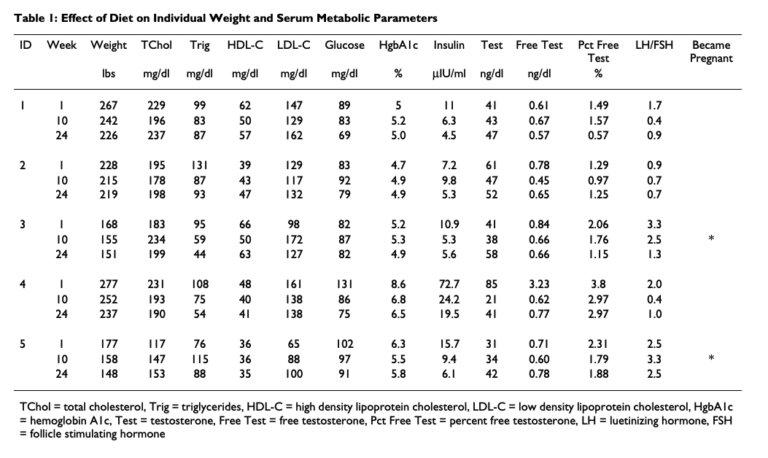Question: Can a ketogenic diet lead to meaningful improvements in patients with polycystic ovary syndrome (PCOS)?
Takeaway: In this small pilot trial, significant reductions in free testosterone levels, luteinizing hormone (LH) to follicle-stimulating hormone (FSH) ratio (1), serum insulin levels, and body weight were observed in five patients who followed a ketogenic diet for 24 weeks. Two patients with a history of fertility issues became pregnant. These preliminary results suggest diet may support amelioration of PCOS symptoms.
Polycystic ovary syndrome, or PCOS, is the most common endocrine disorder among reproductive-aged women and is characterized by elevated testosterone levels, menstrual disturbances, excessive body hair, and infertility (2). Previous research has associated PCOS with insulin resistance, obesity, and poor metabolic health (3). This small pilot study tested the effects of a ketogenic diet in overweight women with PCOS.
Eleven women enrolled in the trial. All were given an Atkins diet book and intensive group coaching on how to follow a ketogenic diet. Their carbohydrate intake was limited to no more than 20 grams per day (4).
Six subjects were unable to follow the protocol for the entire 24 weeks. The remaining five subjects were highly compliant with the dietary prescription, as evidenced by high serum ketone levels at all tested timepoints.
Subjects lost an average of 12.1% of their initial body weight, and serum insulin levels decreased significantly. Serum testosterone levels decreased 30%, and LH/FSH ratios decreased 36%. Two subjects who noted previous fertility problems became pregnant over the course of the trial. Changes to lipids and other metabolic parameters were not statistically significant. The changes to all five subjects who remained compliant with the diet are summarized in the table below.

Overall, this trial provides preliminary evidence that a ketogenic diet can lead to significant improvements in endocrine levels in overweight PCOS patients. Future research can expand on these observations by exploring the effects of other metabolic therapies, including exercise and other dietary interventions, in patients with PCOS.
Notes
- The ratio LH to FSH is generally 1:1 in healthy patients and is frequently disturbed (with elevated LH relative to FSH) in patients with PCOS. This is generally due to elevation in LH levels. Given the role LH and FSH play in fertilization, this distortion may play a role in observed fertility issues. Note not all women with PCOS will have an elevated LH/FSH ratio. For additional information, see “Tests for PCOS – How to Make the Diagnosis?” and “Polycystic Ovary Syndrome: It’s Not Just Infertility.”
- The prevalence and features of the polycystic ovary syndrome in unselected population
- Characterization of groups of hyperandrogenic women with acanthosis nigricans, impaired glucose tolerance, and/or hyperinsulinemia; Medical progress. Polycystic ovary syndrome.; Insulin resistance and the polycystic ovary syndrome: Mechanism and implications for pathogenesis.; Prevalence and predictors of risk for type 2 diabetes mellitus and impaired glucose tolerance in polycystic ovary syndrome: A prospective, controlled study in 254 affected women; Correlation of hyperandrogenism with hyperinsulinism in polycystic ovarian disease
- Dr. Atkins’ New Diet Revolution
Comments on The Effects of a Low-Carbohydrate, Ketogenic Diet on the Polycystic Ovary Syndrome: A Pilot Study
Great to see more and more research in the this area
https://www.ncbi.nlm.nih.gov/pubmed/32092167
So glad we are starting to get real studies done on these subject areas in nutrition!
The Effects of a Low-Carbohydrate, Ketogenic Diet on the Polycystic Ovary Syndrome: A Pilot Study
2